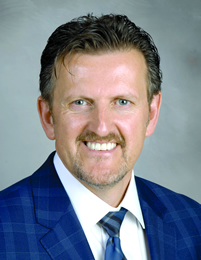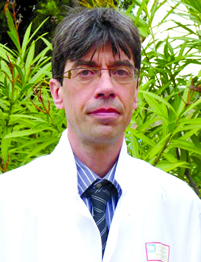A Sunday morning symposium will feature an overview of current translational work on stem cells for the purposes of musculoskeletal regeneration and tissue repair.
Three leading experts in the field will share the current scientific evidence supporting the use of stem cell-based therapies for repair of the musculoskeletal system, stem cell niches in health and disease, and anti-inflammatory activity of stem cells. What Is the Science Behind Mesenchymal Stem Cells Therapy in Arthritis? starts at 8:30 am in room 145A.

Johnny Huard, PhD, Professor and Vice Chair for Research, Department of Orthopaedic Surgery, University of Texas Health Science Center at Houston, TX, and Chief Scientific Officer of the Steadman Philippon Research Institute in Vail, CO, will discuss the evidence supporting cell-based therapies for joint tissue repair, as well as current stem cell applications in the treatment of arthritis.
“The work that we have been doing with mesenchymal stem cells (MSCs) has been for osteoarthritis,” Dr. Huard said. “When you have damage to the cartilage, it is not going to repair by itself, and this is what leads to joint replacement down the road because there is nothing you can do when you’ve got bone on bone. The same thing applies for osteochondral injuries.”
It was thought for many years that in order to use stem cell therapy to repair articular cartilage, the MSCs injected would have to be able to become cartilage cells (chondrocytes), Dr. Huard said.
“What we and others have found in recent years is that actually very few of the cells become chondrocytes when you inject them,” he said. “But for some reason that we don’t fully understand yet, they are able to signal, or release factors, that attract other cells to come and repair the cartilage. So the next question in articular cartilage repair with stem cells is to discover which cells from the host really are responsible for the repair process.”
Dr. Huard will also discuss ongoing research looking at the potential of using angiogenesis-blocking agents as a strategy to enhance cartilage repair in combination with microfracture surgery.
“Microfracture works, and a lot of people like it, but among the potential problems is that it can lead to fibrocartilage and there is a risk for bleeding, which will basically turn the cartilage into bone,” he said. “If there is bleeding in the knee joint, we know that the repair process will not be good. So now we have a lot of studies going on to see if we block angiogenesis, can we improve stem cell therapy for articular cartilage, as well as improve technologies like microfracture.”

The potential for cell-based therapies to inhibit inflammation in the setting of joint injury and disease will be discussed by Christian Jorgensen, MD, PhD, Director of the Institute of Regenerative Medicine and Biotherapy (IRMB) and Head of the Clinical Unit For Osteoarticular Diseases at Lapeyronie University Hospital in Montpellier, France.
“It has been shown that adipose-derived mesenchymal stromal cells (ADSCs) exhibit functional properties that have opened the way for cell-based clinical therapies,” Dr. Jorgensen said. “Primarily, their capacity for multilineage differentiation has been explored in a number of strategies for skeletal tissue regeneration.”
Recently, he added, MSCs have been reported to exhibit immunosuppressive, as well as healing, capacities that improve angiogenesis and prevent apoptosis or fibrosis through the secretion of paracrine mediators.
“This prompted us to propose adipose-derived stem cells as a possible cell therapy in both osteoarthritis and rheumatoid arthritis,” Dr. Jorgensen said. “We performed pre-clinical models of osteoarthritis and demonstrated that a local injection of ADSCs showed a reduction of synovitis, reduction of osteophytes, joint stabilization, and a reduction in cartilage lesion scores.”
A subsequent open-label phase 1 trial included 18 patients with severe osteoarthritis of the knee who failed conventional therapies. Mean age of the study group was 61 years with a 10-year history of knee osteoarthritis. Patients received a single intra-articular injection of autologous ADSCs 15 days after lipoaspiration. Dr. Jorgensen reports that he and his fellow investigators observed a decrease of both VAS and WOMAC pain scores.
“We believe this study confirms the feasibility and safety of local injection of autologous cells from adipose tissue,” Dr. Jorgensen said. “A phase 2 randomized trial is ongoing, but it appears that MSC-based therapy for osteoarthritis is safe and seems to improve symptoms associated with osteoarthritis. Other rheumatic diseases, including intervertebral disc disease, rheumatoid arthritis, scleroderma, and lupus, may also benefit from this strategy.”
Also presenting in this symposium will be Cosimo De Bari, MD, PhD, Professor of Translational Medicine and Head of the Arthritis and Regenerative Medicine Laboratory at the University of Aberdeen School of Medicine, Medical Sciences and Nutrition in Scotland. Dr. De Bari will describe the various niches within the joint where stem cells reside and how these niches are affected by disease and inflammation.
BASIC SCIENCE TRACK
What Is the Science Behind Mesenchymal Stem Cells Therapy in Arthritis?
8:30 – 10:00 am Sunday • Room 145A
